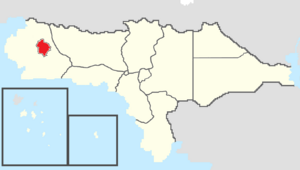Onnohou Nation: Difference between revisions
No edit summary |
No edit summary |
||
| Line 9: | Line 9: | ||
|image_alt = | |image_alt = | ||
|image_caption = | |image_caption = | ||
|image_flag = | |image_flag = Indigenous_Flag_Onnohou.png | ||
|flag_alt = | |flag_alt = Flag | ||
|image_seal = | |image_seal = | ||
|seal_alt = | |seal_alt = | ||
Revision as of 22:04, 12 July 2021
This article is incomplete because it is pending further input from participants, or it is a work-in-progress by one author. Please comment on this article's talk page to share your input, comments and questions. Note: To contribute to this article, you may need to seek help from the author(s) of this page. |
Onnohou Nation
Gevnadena Ono'ho | |
|---|---|
Sovereign Indigenous Nation | |
| Motto(s): | |
 Map of Rizealand with the Onnohou Nation in red | |
| Country | |
| Before admission | Onnohou Territory |
| Capital (and largest city) | Fort Liberty |
| Joined Federation | February 6, 1976 |
| Government | |
| • Principal Chief | Thomas Wesa |
| • Legislature | Onnohou National Assembly |
| • Federal representation | Councilors
|
| Area | |
| • Total | 16,137.62 km2 (6,230.77 sq mi) |
| Population (2021) | |
| • Total | 111,567 |
| • Density | 6.91/km2 (17.9/sq mi) |
| Time zone | UTC+9 (Western) |
| Abbreviation | ON |
| ISO 3166 code | RZ-ON |
| Website | www |
The Onnohou Nation (Onnohish: Gevnadena Ono'ho), commonly known as the Onnohou, is a sovereign indigenous nation in northwestern Rizealand that resides in an enclave within New Estmere. The Onnohou Nation's territory has a total area of 16,137.62 square kilometers, making it the second largest sovereign indigenous nation and fourth smallest political division of Rizealand. The Onnohou Nation also has a population of 111,567, making it the second most populous indigenous nation and third least populous political division of Rizealand. The Onnohou Nation's capital and largest settlement is Fort Liberty.
Etymology
The Onnohou Nation and the preceding Onnohou Territory are named after the Onnohou indigenous people, who inhabited and formed both. The name "Onnohou" is derived from the Onnohish name "Ono'ho" which means "spirit children" or "children of the spirit."
